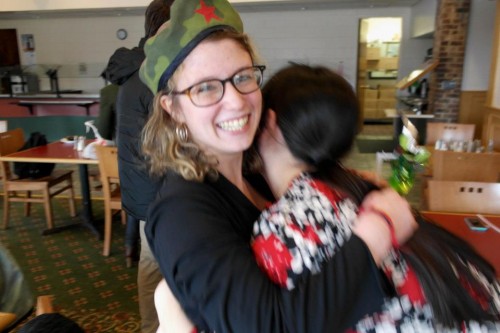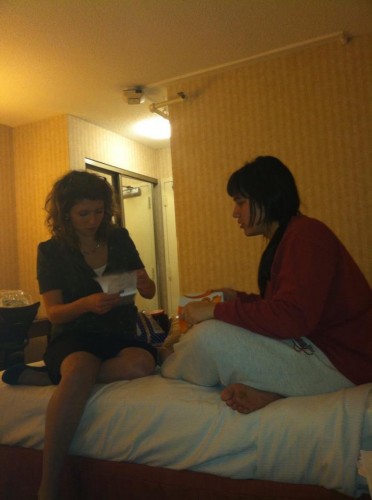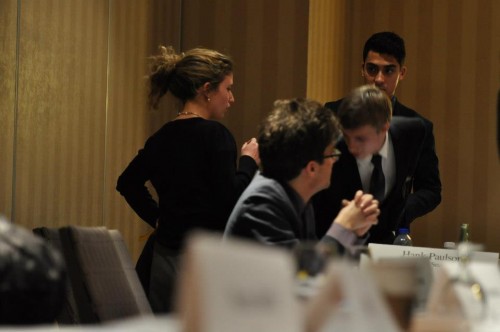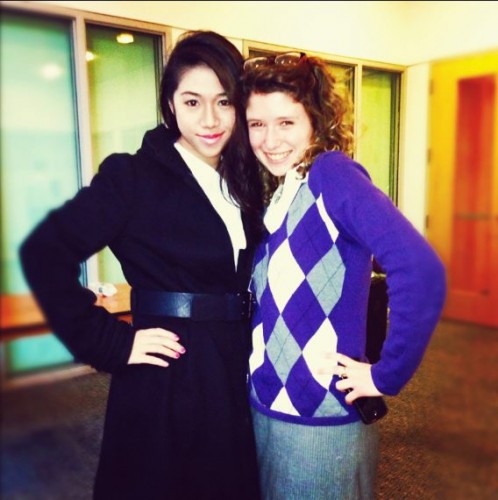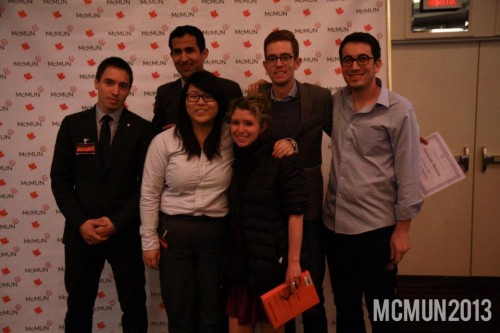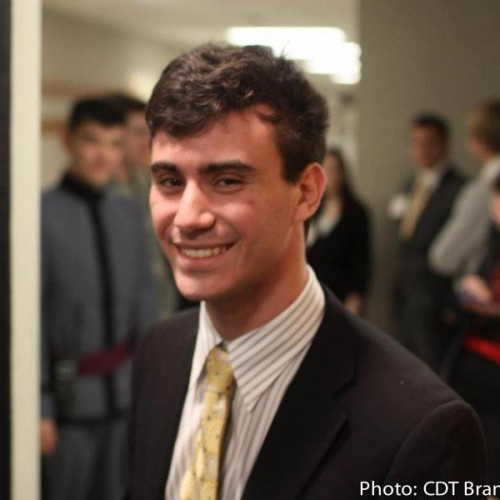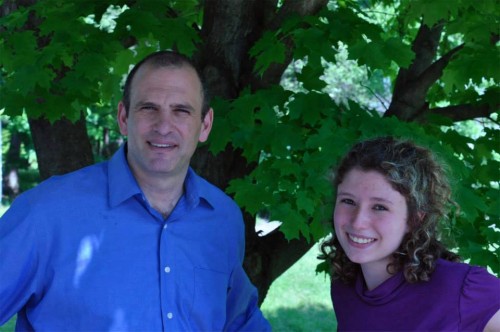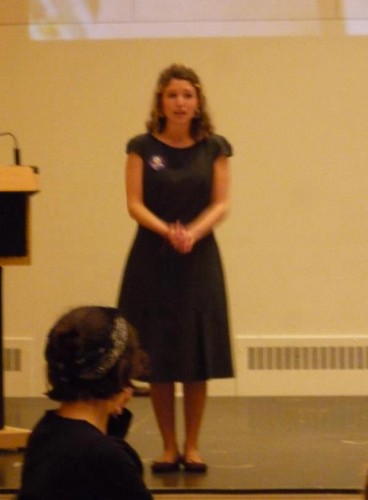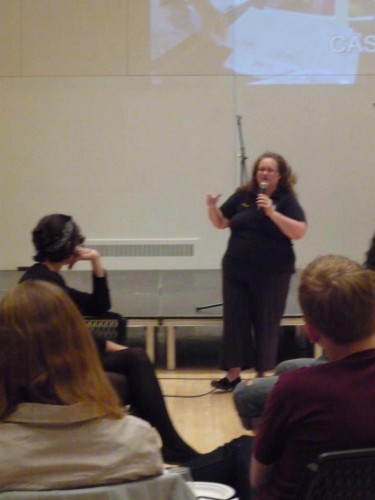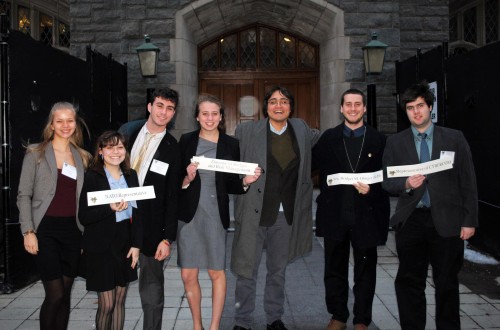
Bard delegates at WPMUNCI (from left) Melina Vanni-Gonzàlez, Alexander Echelman, Carly Krim, Brian Harris, Ian Sicurella, and Gabriel Matsakis.
A famous adage says that, “If you give a man a fish, you feed him for a day, but if you teach him to fish, you feed him for a lifetime.” Rory Mondshein, a rising senior at Bard College and President of Bard’s Model UN team, is living proof that if you teach your delegates how to be a team, you are building an exceptional program for a lifetime. Although it is Mondshein’s quick-witted thinking and informed political stance, and exceptional speaking abilities that has gotten her awards at Yale and, most recently, at McGill University’s Model UN conference, this year, it was what was brewing behind the scenes of the team’s performance that tested the patience, willpower, and problem-solving skill, and branded her as a Model UN revolutionary.
Faced with a penny budget and an extreme lack of team members, Mondshein was determined to save what she viewed as, a crumbling team. She carefully laid out her plan to divide and conquer the challenges, and Mondshein decided that she would start with recruitment.
“I would just hang out in the cafeteria, or go to my classes early and just start talking about Model UN, hoping that would attract people,” Mondshein says.
After a long and hard recruitment process, Mondshein finally saw some results, and managed to put a team together before the Security Council Simulation at Yale. Yevgeniya Tsoy, an exchange student from the American University of Central Asia, recalls the first time she met Mondshein and was asked to join Model UN.
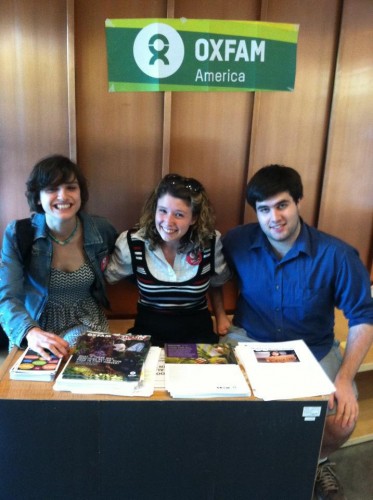
Mondshein (center) with Adrianne V. Kirk of Students for Women’s Equality and Righrs, and delegate, Gabriel Matsakis, at a joint screening of Sisters on the Planet.
“Rory and I met in our Research Methods class,” says Tsoy. “She asked me if I was interested in joining Model UN. I thought she was crazy, but she offered to sit with me for as long as it took to make me feel comfortable. She was very understanding about the whole thing.”
The next order of business, Mondshein knew, was to better the performance of the team, and individual attention to each new recruit was crucial to the process. In order to best prepare the team, Mondshein held office hours, during which her delegates could ask questions and write papers communally.
Katie Reilly, a junior at Bard College, says that Rory’s dedication to the team knew neither limits nor time constraint. “Rory had us all come to her when we needed help. She was really proactive in getting people settled and making sure we understood everything. By working with us, she made sure we were prepared for our first simulation,” says Reilly. “Her eagerness to help was really inspiring.”
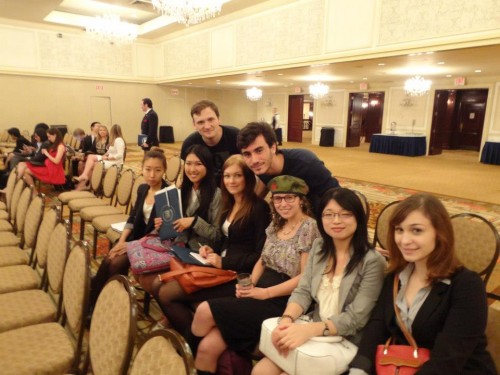
Bard delegates atYale (top row) Brian Strigel and Alexander Echelman. (bottom row) Soojin Jung, Zhenya Tsoy, Ksenia Chapkevich, Mondshein,Yuchen Xu, and Katie Reilly.
Ksenia Chapkevich, an exchange student from Smolny College, explains that Mondshein guided her through the MUN procedures and was her window to understanding what would happen in committee.
“When I first came to Model UN, it was so hard to understand what was going on,” says Chapkevich. “Thankfully, Rory helped me a lot! She taught me the rules, helped with duties and provided the materials for the MUN delegation. Simply saying, she was my everything.”In addition to helping her delegates with position papers, Reilly explains that Rory coordinated with the school cafeteria to reduce the cost of food at the conference. “She was on top of everything and made sure everyone was on time to leave for the conferences.”
However, Gabriel Matsakis, a sophomore Bard delegate, explains that Mondshein’s job was more complicated than others would imagine. Plagued by apathy, the Bard Model UN team was notorious for missing committee last year — an attitude Mondshein sought to change during her presidency.
To give context, Matsakis described the previous year’s delegation as “disorganized due to a lack of motivation in some of our members, and the leadership’s unfortunate apathy towards this attitude. We were funded, and getting to conferences, but when we arrived there were a lot of incidents of skipped committees, and unprepared delegates, which our president did nothing to control. Rory stepped in when necessary, ensuring that delegates got to committee and even organizing various aspects of trips, going so far as to show up on Club Head Day when our president didn’t. This year things ran smoother from the onset, with Rory rescuing our budget, and an influx of new members with greater motivation.”
Bard delegate, Brian Strigel, explains that Mondshein took unconventional measures to ensure that her delegates were motivated, stating that “she would call us in the mornings at fifteen minute intervals to make sure that we were awake and getting ready for committee. It got on everyone’s nerves. But from what I hear about last year, it seemed necessary. She was pushy for a good cause, and it paid off in the end.”
Mondshein explains that last year’s unfortunate circumstances necessitated the fifteen minute wake-up calls and outlined her rationale, “My delegates need to remember that they are representing themselves and Bard College at these conferences. As someone that does the budget, I can tell you how expensive it is to go, but, unlike some schools, Bard fully funds our delegates’ fees, and expect us to fully participate. When my group does not go to committee on-time, they are wasting time, money, and an opportunity that others wish they had. I want to make sure that my delegates understand that, so I try and foster good habits. Last year, my delegates used to come late, and those fifteen-minute wake up calls ensured that they were not tardy again. They were a necessary, and effective evil.”
Mondshein’s unconventional tactics seemed to work when one of her delegates received an “Honorable Mention” at Yale’s conference for his performance as the Muslim Brotherhood. Although Mondshein did not receive an award, herself, she made an incredible impression on those she worked with.
Andrew Soluk, a sophomore delegate from Cornell University, says while Mondshein’s leadership at Yale was to some extent competitive, it was ultimately based in creating a foundation for the unity of the team as a whole. “Rory was a very dynamic leader who definitely focused on more than just winning. She is a team builder through and through. She actually cares about building the relationships within her team to form one solid unit, in order to make it an organization that others will want to join and really be a part of.”
Mondshein was also recognized for her leadership by Secretary General of the Security Council Simulation at Yale, Niko Efstathiou, who attributes Mondshein’s success to her ability to uphold the balance between depicting a competitive and respectful demeanor.
“With hundreds of delegates and dozens of schools participating, perhaps one of the most valuable skills in the collegiate Model UN circuit is being memorable for the right reasons,” says Efstathiou. “Rory was incredibly fiery during committee sessions, but also very professional cooperative and helpful in her feedback for our conference, and definitely stood out during SCSY.”
Bard delegate Gabriel Matsakis explains, “The thing about Rory is that she’s very good at forming connections, and she has contacts almost everywhere throughout campus and the Model UN scene. As a result, when we need something done, she knows who to ask, who to push, and who to pull. Although her plans may not always run perfectly, they always pull through, and have really transformed the way we get things done on the Bard Model UN team. Rory’s overpowering enthusiasm for Model UN is the driving force behind her presidency and many of our successes this year. Whatever the challenge, whatever the means necessary, Rory got the job done.”
However, after the Security Council Simulation at Yale, Mondshein turned to her next project, which was restoring the team’s budget. She first appealed to Bard’s Student Government Association, filling out an emergency budget request. She ran into a major obstacle when the school’s Planning Committee agreed to fund the team at Yale, but could not commit to funding their next conference at Northeastern University’s Model Arab League (NERMAL). Faced with a dilemma, Mondshein had to make a decision that would define her presidency: she could either take a risk and reapply without guaranteeing the funding, or give up the $350 allocated to starting her Mock Trial initiative. Mondshein chose the latter.
“It was actually the easiest decision of my presidency,” Mondshein says. “I could either choose a program that was proven effective, or start a new project. To me, the choice was pretty obvious.”
Mondshein’s choice appeared to be the right one when two of her delegates, Liana Chu and Nicolas Luongo, snagged an “Honorable Mention” for their work as Yemen in the Arab League Reform committee.
Liana Chu, the Bard newbie-turned award winner, says that Mondshein helped her transform from a timid speaker to a prepared, well-informed member of the team. She explains, “When Rory encouraged me to join Model UN, I did not know anything, and there was very little time to learn before my first conference. Rory coached me beforehand, and made sure I was placed with an experienced delegate which gave me time to get used to the process. Joining Model UN has been a wonderful experience, and I owe it all to Rory.”
Yet, although Mondshein did not receive an award at NERMAL, she drew attention for her incredible leadership during the conference. Delegate Kaylee Boalt of Converse College, recalls her experience with Rory, explaining that she has “an amazing go-get-’em attitude. She’s organic, thoughtful, and creative. She’s also willing to go where other leaders aren’t and it produces great results.”
And Mondshein did produce great results, even if it did not come in the form of an award until McGill University’s Model UN Conference, McMUN.
Unfazed by the 1,400 delegates at McMUN, Mondshein stood out for her performance as Secretary of the Treasury, Hank Paulson, in the Wall Street 2008 committee, receiving an award for her hard work.
McMUN dais member, Cynthia Snell, of McGill University, explained the basis for Rory’s award, explaining that Rory “displayed great commitment to the topic of discussion, understanding and working within the scope of the committee to develop comprehensive and innovative solutions. She was an asset in complex debate, actively pursuing alliances, while remaining true to her assigned role.”
With the competition season over, Mondshein could finally focus on improving the quality of on-campus activities, first hosting a “Conference for a Day” for Bard students on North Korea: 2040 — a simulation borrowed from Yale’s Security Council Simulation.
“My delegate, Melina Vanni-Gonzàlez, told me that she wanted to host a conference for Bard students, and I thought it was absolutely brilliant. I wanted to help out as much as I could. However, Melina really took the initiative on this one, and it turned out phenomenally. So many people gave us compliments for it,” Mondshein says.
After the successful “Conference for a Day,” Mondshein was determined to host more on-campus events. However, Mondshein insisted that Model UN’s events be educational, and opted to host an Oxfam-inspired Hunger Banquet — an event that she had wanted to host for two years.
“I wanted to do an Oxfam Hunger Banquet for two years, but, for some reason, our team just could not get it together. However, I was determined to make it happen, and, this year, I am proud to say that we finally pulled it off, and did it well. We had over thirty people attend our Hunger Banquet, and raised a significant amount of money for Oxfam and the Queens Galley. I was so impressed with the results,” Mondshein says.
Yet, it was not all easy for Mondshein; her delegates explain that she faced a lot of scrutiny for her controversial leadership styles, and that, sometimes, the criticism would come in the form of personal attacks. Consistently impugned for her unique tactics, Mondshein found that the biggest challenge was trying to stay professional, and not let it get to her.
However, to complicate things, Mondshein had two sickly grandmothers to worry about at home, and who both passed away in the second semester. Oftentimes, Mondshein had to balance between her personal life and professional, which sometimes proved to be a challenge. Mondshein explains, “At the first Model UN meeting of the second semester, I got a phone call that told me that my grandmother passed away. Naturally, I wanted to take some time off to deal with the situation, and my emotions. However, we were in the middle of the meeting, and I knew that I was responsible for more than just myself. That said, I had to set an example and keep going, even if that was the harder choice.”
Luckily, Mondshein says, she received a lot of support from both her delegates and her professors, including her Model UN adviser, Jonathan Becker, whom she says she really looks up to.
“Dr. Becker was extremely supportive, often meeting with me to discuss team affairs and anything else that I needed. However, he was never afraid to take an opposing stance. Although we didn’t always agree with each other, my meetings with Dr. Becker challenged me to be a better delegate because it taught me to articulate my points while listening to his. Our differences may have tested our ability to work with each other, but, at the end of the day, it made our team a lot stronger. While Dr. Becker was careful to not give me the answers, he highlighted some of my weaknesses that I wasn’t really seeing, and that helped me evaluate my situation differently.”
In his official statement to Best Delegate, Becker applauded Mondshein for her hard work, stating “Rory Mondshein has done an excellent job as president of the Bard Model UN team. Her efforts have focused on team building and the imprint of Model UN on campus, and the team came together in amazing ways. The team, itself, was a mini-UN, with students from countries including Russia, China, South Korea, Kyrgyzstan, and Turkmenistan, and, as to the team, Rory has led by example, demonstrating through in class simulations and her thorough position papers how to approach MUN. As far as campus life is concerned, Rory shaped programming on everything from screening movies on global issues to holding an Oxfam inspired Hunger Banquet to raise knowledge and interest in issues related to hunger nationally and internationally. The hard work has paid off, and we already have more students registered for Model UN for next year than ever before.”

Mondshein (right) and delegate,Anna Stafeyeva, register delegates for Bard’s first “Conference for a Day”
Co-founder of Best Delegate, Kevin Chan, who also does coverage of the college circuit, explained that, though there were drawbacks, the team, which, under Mondshein’s careful, constant and consistent leadership has defied every challenge and roadblock thrown its way, will continue its success.
“Oftentimes,” Chan says in an email, “the stories about small teams overcoming obstacles does not get showcased because it gets lost among the stories of big teams winning at competitive conferences. Luckily, we have data that alerted us of this story. First, Bard’s team had a successful year in terms of awards won and enabled it to be ranked in the Top 50 in North America. Second, Rory Mondshein received many nominations from students from multiple schools for the College All-Star team. Although she did not ultimately receive enough votes to make the College All-Star Team, the data led us to further investigate her background and the team’s story, and we found out that she is admired by delegates from her own school and beyond for putting Bard on the map.”
When asked about her future plans, Mondshein could not be too sure. “I am so grateful for the opportunity I had this year, and, honestly, I did not know what to expect. Of course, I imagined things to go a lot differently, but I’m grateful for the challenges we faced because it made us a stronger team. Who knows what we’re going to see next year? The only thing I do know is that Bard Model UN is in a much better place than before, and I can’t wait to see the progress we make in the future.”
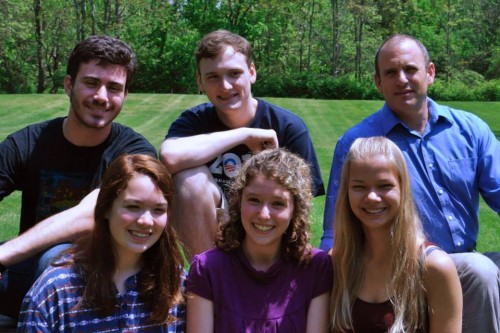
Some members of the Bard Model UN team at their end of the year party. (Clockwise from left) Alexander Echelman, Brian Strigel, Coach Jonathan Becker, Anna Stafayeva, and Rory Mondshein.

